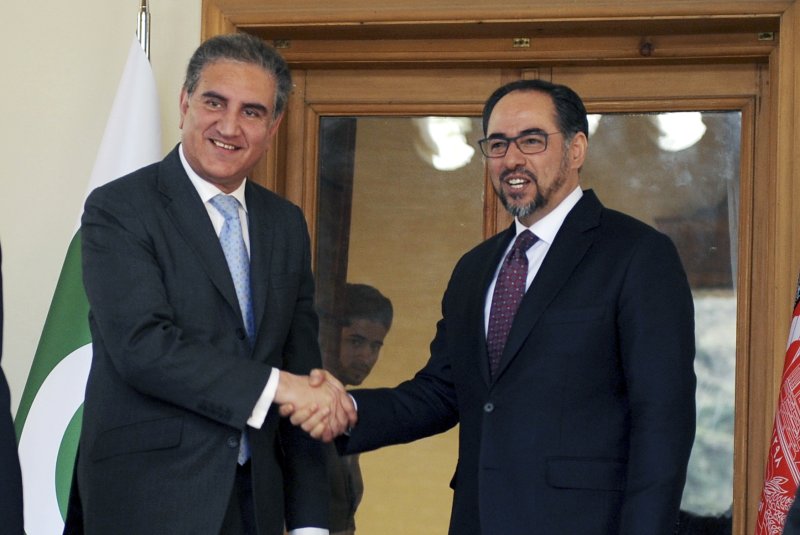Pakistan's Minister of Foreign Affairs Shah Mehmood Qureshi (L) and Afghanistan's Foreign Minister Salahuddin Rabbani shake hands Saturday after a trilateral anti-terrorism conference that included China in Kabul, Afghanistan. Photo by Jawad Jalali/EPA
Dec. 15 (UPI) -- Pakistan, Afghanistan and China on Saturday signed a pact to enhance counterterrorism security cooperation in reaffirming their relations.
The three foreign ministers also announced they will work on regional issues and economic development during a news conference in Afghanistan's capital city of Kabul.
A third meeting is planned for next year in Islamabad, Pakistan.
Last year, China hosted the inaugural meeting in an effort to improve Afghanistan's relationship with Pakistan.
After the meeting, Chinese Foreign Minister Wang Yi said because Afghanistan and Pakistan are friends of his nation, Beijing will attempt to extend cooperation by building trust and confidence between the two countries.
He said China will help extend connectivity projects, including a rail line between Peshawar and Kabul as well as Kandahar in Afghanistan and Quetta in Pakistan.
Pakistani Foreign Minister Shah Mehmood Qureshi said regional peace has been threatened through terrorist entities that include the Islamic State, the anti-China East Turkistan Islamic Movement and Islamic Movement of Uzbekistan.
"We signed today an MoU [memorandum of understanding] on counterterrorism and security. This is a step forward and I think it will help us achieve what we collectively want to achieve," Qureshi told reporters.
He said although Pakistan is making efforts to promote a reconciliation process in Afghanistan, it is up to Afghans to achieve a political settlement to the war.
Afghan officials have said that Pakistan allows Taliban leaders to hide in their territory and direct their violent insurgency from there.
"There are groups in the region who have been getting support and who have been involved in this violence in Afghanistan," Afghan Foreign Minister Salahuddin Rabbani said. "We need to see countries in the region, particularly in this case Pakistan, to support this initiative of peace and reconciliation and support us in reducing this growing violence and ultimately eliminate the violence throughout Afghanistan."
The Pakistani foreign minister urged both sides to stop accusing each other.
"We will have to be more positive," Qureshi said. "We will have to realize that by blaming each other we are going nowhere. We have spent decades, we have seen devastation, we have seen people killed and maimed on both sides of the border. Time has come to move on. Time has come to stop pointing fingers."
The Chinese and Pakistani foreign ministers urged Afghanistan to join their bilateral infrastructure project in Pakistan with the global Belt and Road Initiative.
Qureshi wants Rabani to send a delegation to Pakistan to examine projects to possibly take part in as an effort to for rebuild war-ravaged Afghanistan. And by linking Afghanistan to China-Pakistan Economic Corridor, it would give it better access to trade with Central Asian markets.















